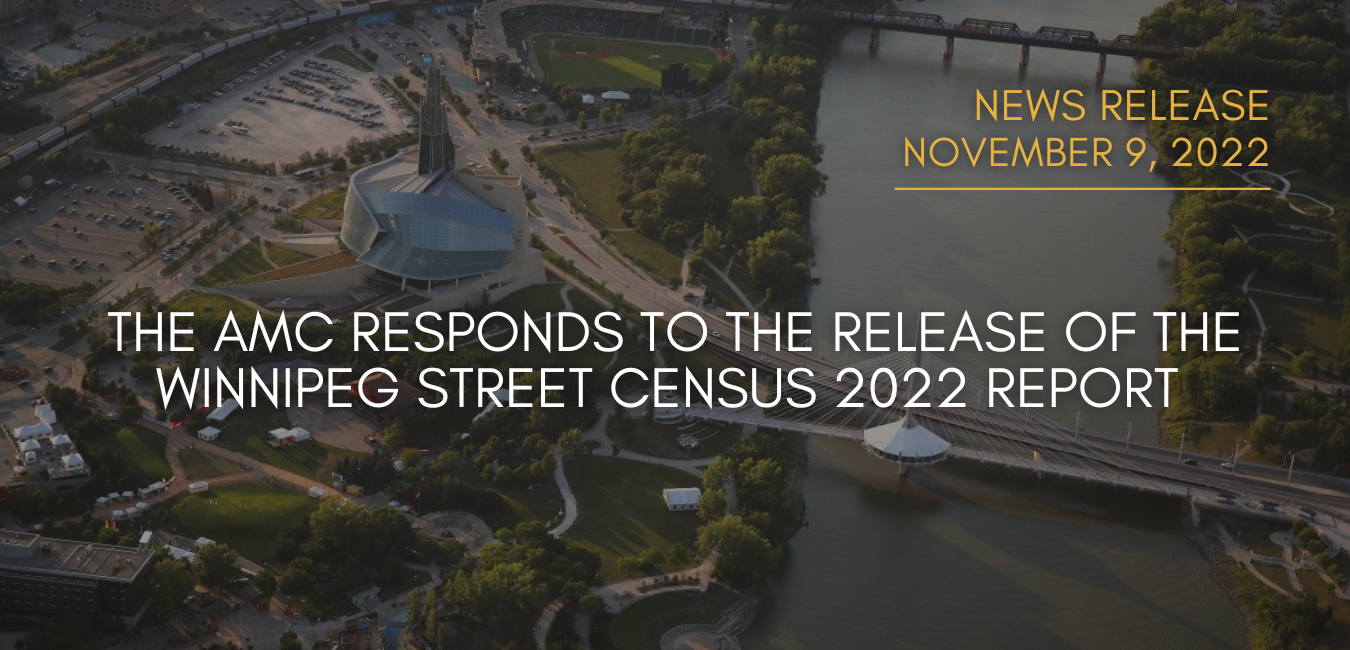The AMC Responds to the Release of the Winnipeg Street Census 2022 Report

November 9, 2022
Treaty One Territory, Manitoba
alexpapineau
Treaty One Territory, Manitoba – The Assembly of Manitoba Chiefs (AMC) issues this statement in response to the release of the Winnipeg Street Census 2022 Report and the key findings which highlight the ongoing overrepresentation of First Nations citizens experiencing homelessness in Winnipeg.
The 2022 Winnipeg Street Census was completed this year on May 24th and 25th across 53 separate locations throughout Winnipeg to get a snapshot of the current state of homelessness in the city. Approximately, 1250 individuals responded to the survey, and based on its findings, 51% of those currently facing homelessness identified as First Nations (status), while an additional 5.3 percent identified as belonging to a First Nation (non-status).
“It is deeply concerning that our First Nations citizens continue to represent the majority of those experiencing homelessness in our city. Right now, in real time, we are witnessing the effect and impact that government policies are having on the lives of our First Nation citizens in Winnipeg. The lack of affordable housing, low wages, inflation, family breakdown, youth released from the CFS system at 18, issues with addiction and alcohol abuse. Since July 2022, as a partner at N’Dinawemak: Our Relatives Place, we had ten relatives who lost their lives in addition to staff having to save the live of 28 others by administrating naloxone and First-Aid CPR. We cannot rely on the government to have our best interests.” stated Grand Chief Cathy Merrick.
Further, the report identifies the lack of change in the numbers as it relates to the Child and Family Services (CFS) system continuing to serve as a pathway into homelessness. The 2022 Winnipeg Street Census findings indicate that over 50% of those who responded to the survey had spent time in CFS foster care, group homes or another placement, and whom many became homeless immediately upon leaving care. Out of those responded, over half (54%) experienced homelessness for the first time at age 18 or often earlier. While 69.5 % of the respondents that indicated involvement with CFS, identified as First Nations.
“The findings across the last three Street Census reports have always identified the direct link between CFS and homelessness,” stated First Nations Family Advocate Cora Morgan. “It is unacceptable that this remains an issue, especially as the province of Manitoba has been working towards reforming the CFS system. In 2019, the province announced changes to the way funding will be provided to CFS by implementing single-envelop funding. It was sold by the province that CFS authorities and agencies would have more authority to direct funds towards prevention and early intervention. However, despite the provinces reform efforts, the outcomes for First Nations children leaving the system remains the same.”
“The province has demonstrated that we cannot rely on them to address the homelessness crisis that many people are facing in Winnipeg. In the last few years, we see the increase in the unsheltered population. There needs to be a collaborative approach with First Nations leading the path to prevent systemic homelessness of our people. We call upon all levels of government to urgently and drastically change its approach to providing services to First Nations children, youth and families and to meaningfully remedy this unresolved overrepresentation,” concluded Grand Chief Merrick.
-30-
For more information, please contact:
Communications Team
Assembly of Manitoba Chiefs
Email: media@manitobachiefs.com
About the Assembly of Manitoba Chiefs
The AMC was formed in 1988 by the Chiefs in Manitoba to advocate on issues that commonly affect First Nations in Manitoba. AMC is an authorized representative of 62 of the 63 First Nations in Manitoba with a total of more than 151,000 First Nation citizens in the province, accounting for approximately 12 percent of the provincial population. AMC represents a diversity of Anishinaabe (Ojibway), Nehetho / Ininew (Cree), Anishininew (Ojibwe-Cree), Denesuline (Dene) and Dakota Oyate (Dakota) people.